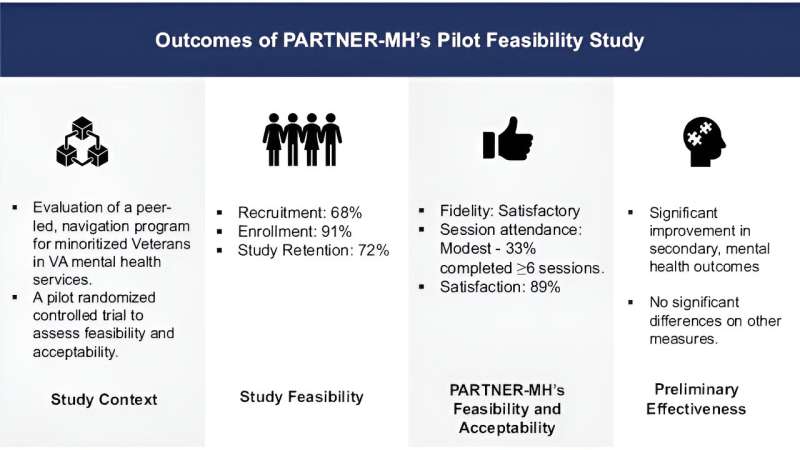This article has been reviewed according to Science X's editorial process and policies. Editors have highlighted the following attributes while ensuring the content's credibility:
fact-checked
peer-reviewed publication
trusted source
proofread
Peer-led patient navigation helps minoritized patients engage in their own mental health care

Research scientists led by Johanne Eliacin, Ph.D., of the U.S. Department of Veterans' Affairs (VA) and Regenstrief Institute, have developed PARTNER-MH, an innovative, peer-led patient navigation program to support racially and ethnically minoritized veterans seeking mental health care, regardless of the types of mental health services needed or their mental health diagnoses.
In two published papers they report significant improvements in mental health outcomes and high participant satisfaction with the program.
PARTNER-MH, developed for VA mental health outpatient clinics, is delivered by peer support specialists to help patients more productively engage with mental health services. It supports patients in identifying their own health and health care priorities, communicating more effectively with clinicians and more actively participating in treatment decision-making so patients' voices are heard and outcomes improved.
"PARTNER-MH holds promise to be applicable to patients seen in many health care systems. Minoritized veterans share many experiences with civilians of minoritized backgrounds. Their experiences with mental health services are not that different in terms of some of the struggles they experience in communicating with their clinicians, accessing services and engaging in treatment," said Dr. Eliacin. "There are a lot of contributions that the PARTNER-MH program could potentially provide to similar populations or groups outside of the VA."
In the pilot study of PARTNER-MH, 50 racially and ethnically minoritized veterans seeking mental health services in the VA were randomized to a control group or to peer navigation. Peer facilitators are veterans who themselves are in recovery either from a mental health condition, substance use condition or military trauma. They use lessons learned and lived experiences in addition to specialized PARTNER-MH training to support other veterans on their journey to better mental health.
The PARTNER-MH program is administered over a six-month period. Designed for in-person interaction, the pandemic required transformation into a telehealth format. Peers interacted regularly with study participants including assessment of unmet social needs, navigation of VA mental health services, personalized counseling and coaching via telephone.
"We recognize that social determinants of health can be major barriers to accessing services and engaging in care," said Dr. Eliacin. "Some patients may have difficulties getting to their appointment or prioritizing their mental health if they are worrying about their next meal or where they're going to sleep at night.
"We don't wait for a patient to reveal that they are struggling," she added. "At their initial meeting, the peer does an assessment so they can connect the veterans to appropriate VA resources and inform the patient's clinician. The peers don't try to solve problems for their patients, but they are great connectors and they follow-up."
About 70 percent of participants in the PARTNER-MH pilot study self-identified as African-American or Black. Other participants were Hispanic, Asian or Native American. All were veterans receiving or waiting to receive services in a VA outpatient mental health clinic.
The study found significant improvement of self-reported mental health and depression among those in the peer navigation group compared with those in the control group at both six months and nine months.
"In the U.S., patients of racially and ethnically minoritized backgrounds have less access to mental health services, lower satisfaction with mental health treatment and poorer health outcomes than White counterparts," noted study senior author Marianne Matthias, Ph.D., a VA and Regenstrief research scientist. "PARTNER-MH is a step toward making mental health care more accessible and equitable."
The work is published in the journals Patient Education and Counseling and Translational Behavioral Medicine.
More information: Johanne Eliacin et al, Veterans' views of PARTNER-MH, a peer-led patient navigation intervention, to improve patient engagement in care and patient-clinician communication: A qualitative study, Patient Education and Counseling (2023). DOI: 10.1016/j.pec.2023.107847
Johanne Eliacin et al, Outcomes of a peer-led navigation program, PARTNER-MH, for racially minoritized Veterans receiving mental health services: a pilot randomized controlled trial to assess feasibility and acceptability, Translational Behavioral Medicine (2023). DOI: 10.1093/tbm/ibad027



















